Jill-Jênn Vie
Researcher at Inria
% Learning Fair Representations % JJV % \Large Link to paper — hyperrefoptions: colorlinks header-includes: - \usepackage{tikz} —
Fairness
“Different models with the same reported accuracy can have a very different distribution of error across population” (Hardt, 2017)
\pause
Crime prediction (watch Psycho-Pass):

Goals
- \alert{Group fairness}: positive rate in group $\simeq$ positive rate overall
- \alert{Individual fairness}: similar people receive similar outcomes
- Find a trade-off between accuracy and fairness
This paper: “Fairness regularizer”
Example of fairness
\centering
See Attacking discrimination with smarter machine learning
Visually
\centering
Formally
\[M_{n, k} = P(Z = k|x_n) \propto \exp(-d(x_n, \alert{v_k}))\]\raggedleft High if $x_n$ is close to $\alert{v_k}$
\raggedright
\[\hat{x_n} = \sum_k M_{n, k} \alert{v_k}\]\only<1>{\(\displaystyle \widehat{y_n} = \sum_k M_{n, k} \alert{w_k}\)} \only<2>{\(\widehat{y_n} = \sum_k \underbrace{M_{n, k}}_{\in \{0, 1\}} \alert{w_k}\)} \only<3>{\(\widehat{y_n} = \sum_k \underbrace{M_{n, k}}_{\in \{0, 1\}} \underbrace{\alert{w_k}}_{\in \{0, 1\}}\)}
$\alert{v_k} \in \mathbf{R}^d$, $\alert{w_k} \in \mathbf{R}$ are \alert{learned}
Objective
- Accuracy
-
$L_y = \sum_n - y_n \log \hat{y_n} - (1 - y_n) \log (1 - \hat{y_n})$
- Reconstruction
-
$L_x = \sum_n x_n - \hat{x}_n ^2$ - Fairness
-
$L_z = \sum_k M_k^+ - M_k^- $
where $M_k^+ = \underbrace{\mathbb{E}+ M{n, k}}_{\textnormal{average across subgroup}}$
\only<1>{\(L = A_z L_z + A_x L_x + A_y L_y\)} \only<2>{\(L = A_z L_z + A_x L_x + A_y \alert{N_D}\)}
Baselines
LR: Logistic Regression
FNB: Fair Naive Bayes
RLR: Regularized LR
LFR: Learning Fair Representations
Results I
Accuracy (high)
Discrimination (low)
\[D = | \mathbb{E}_+ \hat{y}^n - \mathbb{E}_- \hat{y}^n |\]Results I, see paper
\centering
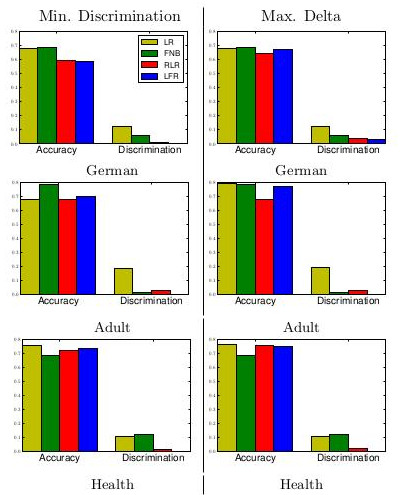 {width=70%}
{width=70%}
Results II
Consistency (high)
\[y_{nn} = 1 - \frac1{Nk} \sum_n \left| \hat{y}_n - \sum_{j \in kNN(x_n)} \hat{y}_j \right|\]Results II
\centering
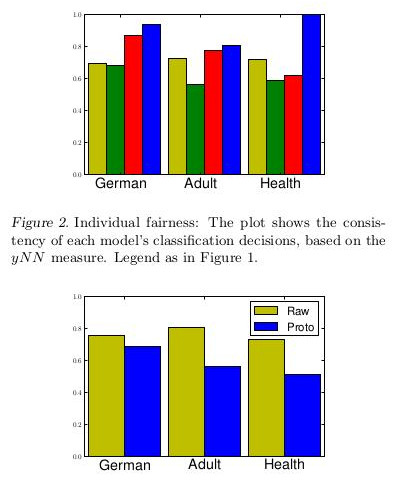 {width=60%}
{width=60%}
Going beyond: AUC constraints
Constraints on AUC or area between ROC curves (ABROCA)
\centering
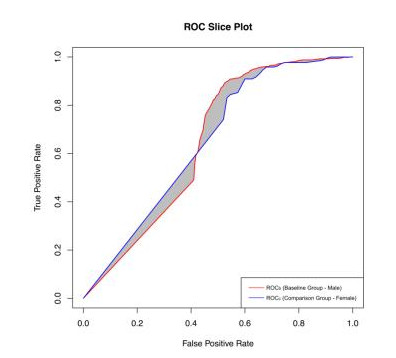 {width=60%}
{width=60%}
\raggedright
Evaluating the Fairness of Predictive Student Models Through Slicing Analysis (Gardner, Brooks and Baker, 2019)
Also works from Bellet next door
Going beyond: Relation to differential privacy
\centering
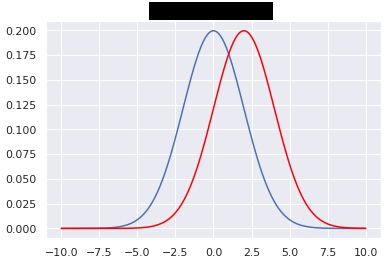 {width=60%}
{width=60%}
\pause
\[\begin{aligned} \forall S \subset \textnormal{Im} A, \forall D_1, D_2 \textnormal{"close"}, Pr(A(D_1) \subset S) \leq e^\varepsilon Pr(A(D_2) \subset S)\\ \forall S \subset \textnormal{Im} A, \forall D_1, D_2 \textnormal{"close"} \left|\frac{\log Pr(A(D_1) \in S)}{\log Pr(A(D_2) \in S)}\right| \leq \varepsilon \end{aligned}\]\raggedright
For more on this beautiful relationship:
Fairness through Awareness (Dwork et al., 2011)
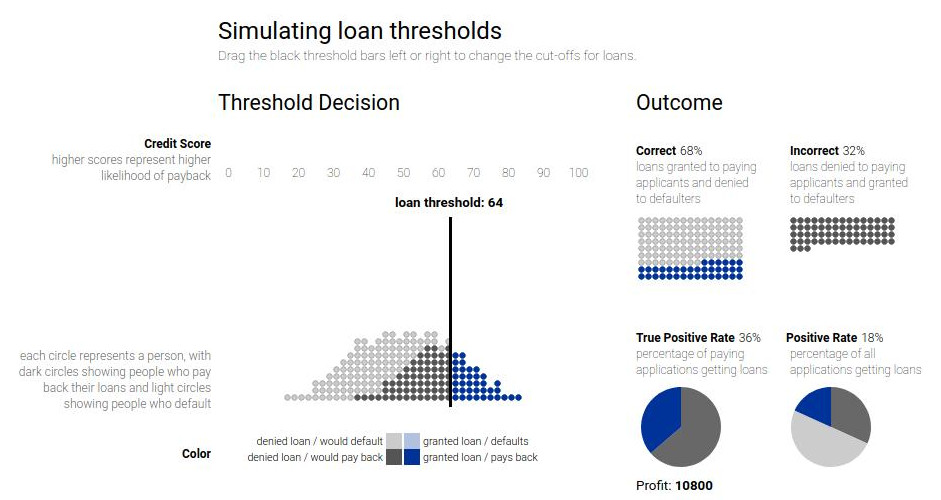 {width=100%}
{width=100%}